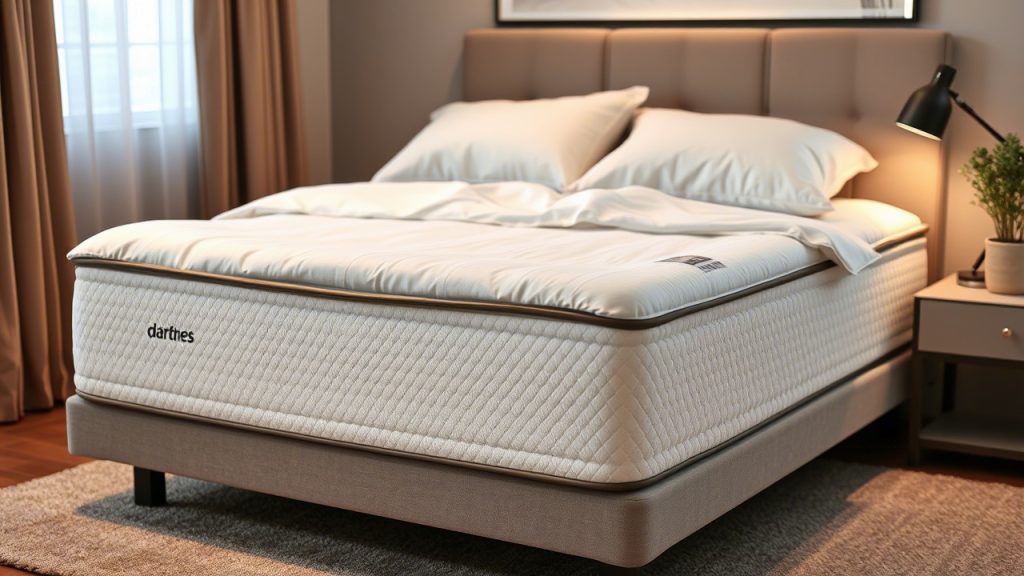Can a Bad Mattress Cause Neck and Back Pain? A Comprehensive Guide
A good night’s sleep is essential for overall well-being, and one of the key elements contributing to quality sleep is a comfortable mattress. But what happens when your mattress is no longer supporting your body in the way it should? Can a bad mattress actually cause neck and back pain? This is a question many people have asked, especially if they’ve experienced these types of discomforts upon waking up.
We will explore the connection between a bad mattress and neck and back pain, the signs that your mattress might be the culprit, and what to do about it.
The Neck and Back Pain: The Basics
Before delving into how a mattress might cause neck and back pain, it’s important to understand the nature of these types of pain.
Neck Pain
Neck pain can range from a minor ache to severe discomfort that limits mobility. The neck (cervical spine) is made up of seven vertebrae, and it is a complex area that includes muscles, tendons, ligaments, and nerves. Pain can result from strain, poor posture, or injury, but it can also be aggravated by an uncomfortable sleep environment.
Back Pain
Back pain is one of the most common complaints among adults. It can affect any part of the back upper, middle, or lower and can be caused by various factors, such as muscle strain, herniated discs, or degenerative conditions like arthritis. Like neck pain, back pain can be exacerbated by a mattress that doesn’t provide proper support.
Can a Bad Mattress Cause Neck and Back Pain?
Yes, a bad mattress can indeed contribute to neck and back pain. A mattress that fails to support your body properly can lead to misalignment of your spine, which can strain muscles and joints. Over time, this can cause or exacerbate pain in the neck, lower back, or even the entire back.
How a Bad Mattress Contributes to Pain
- Poor Spinal Alignment Your spine is designed to maintain a natural curvature when you lie down. A mattress that is too firm or too soft may fail to keep your spine in proper alignment. This misalignment can lead to pressure on the spine, muscles, and ligaments, resulting in pain and discomfort.
- Insufficient Support If your mattress is sagging or has worn-out spots, it won’t provide the support your body needs. Lack of support can cause uneven weight distribution, which leads to pressure points, particularly on the lower back and neck. Without support, your body will also struggle to maintain good posture while sleeping.
- Pressure Points When a mattress doesn’t conform to the body’s contours, certain areas, such as the shoulders, hips, and lower back, can experience increased pressure. This pressure can irritate soft tissues and nerves, leading to pain. For those with neck pain, the pressure on the cervical spine can cause discomfort that lingers throughout the day.
- Improper Firmness The firmness level of a mattress plays a critical role in supporting your body. A mattress that is too firm can push against pressure points in your body, while one that is too soft can allow your body to sink into it too deeply. Both scenarios can throw off your spine alignment and cause muscle strain and discomfort. The ideal firmness level provides just the right amount of cushioning while supporting your spine’s natural curves.
- Lack of Motion Isolation A mattress that does not isolate motion properly may lead to disturbances in your sleep due to movement from a partner. Continuous disruptions, such as tossing and turning, can prevent your muscles from fully relaxing during sleep, which may contribute to muscle tension and pain.
Signs That Your Mattress May Be Causing Neck and Back Pain
If you wake up with neck and back pain or feel sore throughout the day, your mattress could be to blame. Here are some signs that indicate your mattress may not be doing its job:
1. Morning Pain
If you consistently wake up with neck or back pain that subsides after a few hours of moving around or stretching, your mattress might be the cause. When you sleep on an unsupportive surface, your muscles and spine are not getting the support they need, leading to discomfort that tends to improve once you get out of bed.
2. Sinking or Sagging Mattress
A mattress that sinks in the middle or shows signs of sagging might not be providing adequate support. If you notice that the mattress is no longer level or your body sinks into it when lying down, it’s a clear indicator that the mattress is no longer offering the support your body needs.
3. Waking Up with Stiffness
Stiffness and soreness are common signs of improper sleep support. If you feel stiff and tight, especially around your back or neck, this could be a sign that your mattress isn’t keeping your spine in the correct position during sleep.
4. Trouble Sleeping or Frequent Tossing and Turning
If you constantly toss and turn at night or struggle to find a comfortable position, it could be because your mattress is not supportive enough or doesn’t provide the right level of comfort. Lack of proper support can prevent your body from finding a neutral, comfortable sleeping position.
5. Pain That Improves with Movement
If you notice that your neck and back pain improves with walking, stretching, or other movements, it’s a good indication that your mattress may be to blame. Sleeping on a poor mattress can lead to pressure points and discomfort that ease when you get out of bed.
How to Choose a Mattress to Prevent Neck and Back Pain
If you’re dealing with neck or back pain, it may be time to replace your mattress. When shopping for a new one, here are some important factors to consider:
1. Firmness Level
The firmness of a mattress plays a crucial role in spinal alignment. Generally, a medium-firm mattress is considered the best choice for most people, as it provides a balance between support and cushioning. However, firmness preferences vary from person to person. Stomach sleepers, for example, often need a firmer mattress, while side sleepers may benefit from something softer to cushion the shoulders and hips.
2. Support
Ensure the mattress offers adequate support to keep your spine in a neutral position. Memory foam, hybrid, or latex mattresses are often great choices for individuals with neck and back pain, as they offer even support and help alleviate pressure points.
3. Material
Consider the material of the mattress. Memory foam mattresses are well-known for contouring to your body, which can reduce pressure on the spine and joints. Latex mattresses are also durable and offer responsive support, making them a good option for individuals with pain. Hybrid mattresses, which combine the best of innerspring coils and memory foam, provide both support and cushioning.
4. Motion Isolation
If you sleep with a partner, consider a mattress that isolates motion well, such as a memory foam or hybrid mattress. This will help prevent disturbances from your partner’s movements, allowing you to get deeper, uninterrupted sleep, which is important for muscle recovery and pain relief.
5. Temperature Regulation
If you tend to sleep hot, look for a mattress with temperature-regulating properties. Mattresses with cooling technology or gel-infused memory foam can help maintain an ideal sleeping temperature, preventing discomfort that might worsen pain.
Tips for Reducing Neck and Back Pain While Sleeping
In addition to choosing the right mattress, the following tips can help reduce neck and back pain while you sleep:
- Sleep Position Your sleep position can play a significant role in neck and back pain. Try to maintain a neutral sleeping position where your head, neck, and spine are aligned. Sleeping on your back with a pillow under your knees or on your side with a pillow between your knees can help maintain proper alignment.
- Use a Supportive Pillow A good pillow supports the natural curve of your neck. For back sleepers, a medium-thin pillow is ideal, while side sleepers may benefit from a thicker pillow to fill the gap between the neck and the mattress.
- Stretch Before Bed Gentle stretching before bed can help release tension in your muscles and improve flexibility, which can reduce the risk of waking up with pain.
- Sleep on a Consistent Schedule Maintaining a regular sleep schedule helps ensure that your body gets the rest it needs to repair and recover, reducing the risk of muscle strain and discomfort.
Frequently Asked Questions (FAQ)
1. Can sleeping on a bad mattress cause long-term back problems?
Yes, consistently sleeping on a mattress that does not provide proper support can lead to chronic pain, muscle tension, and even spinal issues over time.
2. How do I know if my mattress is bad for my back?
Signs that your mattress may be bad for your back include waking up with stiffness or pain, noticeable sagging, and difficulty finding a comfortable sleeping position.
3. Is a firmer mattress always better for back pain?
Not necessarily. The ideal mattress firmness depends on your sleep position and personal preference. Medium-firm mattresses are typically the best option for most people, but individual needs may vary.
4. How often should I replace my mattress to avoid pain?
Most mattresses should be replaced every 7-10 years. However, if you notice discomfort or sagging earlier than that, it may be time for a new mattress.
5. Can a mattress with memory foam help alleviate back pain?
Yes, memory foam mattresses are known for their ability to contour to your body, relieving pressure points and promoting better spinal alignment, which can help alleviate back pain.
6. Are adjustable mattresses a good option for neck and back pain?
Adjustable mattresses can be beneficial, as they allow you to change the position of the mattress to provide more support for different areas of your body, reducing pain and discomfort.
7. How do I choose the right pillow to avoid neck pain?
Choose a pillow that supports the natural curve of your neck. The ideal pillow will vary based on your sleep position back sleepers often need a medium-thin pillow, while side sleepers may need a thicker pillow.
8. Can changing my mattress improve my quality of sleep?
Yes, a supportive mattress can significantly improve your sleep quality by keeping your spine properly aligned and reducing discomfort.
9. What other factors can contribute to neck and back pain aside from a bad mattress?
Poor posture, lack of exercise, muscle strain, and underlying medical conditions can also contribute to neck and back pain.
Conclusion
A bad mattress can indeed contribute to neck and back pain by failing to provide the necessary support and alignment your body needs. If you’re waking up with discomfort or experiencing stiffness throughout the day, your mattress could be to blame. Choosing the right mattress, along with improving your sleep posture and using supportive pillows, can significantly reduce pain and improve your overall sleep quality.
By understanding how your mattress impacts your body and making adjustments accordingly, you can wake up feeling refreshed and pain-free.





